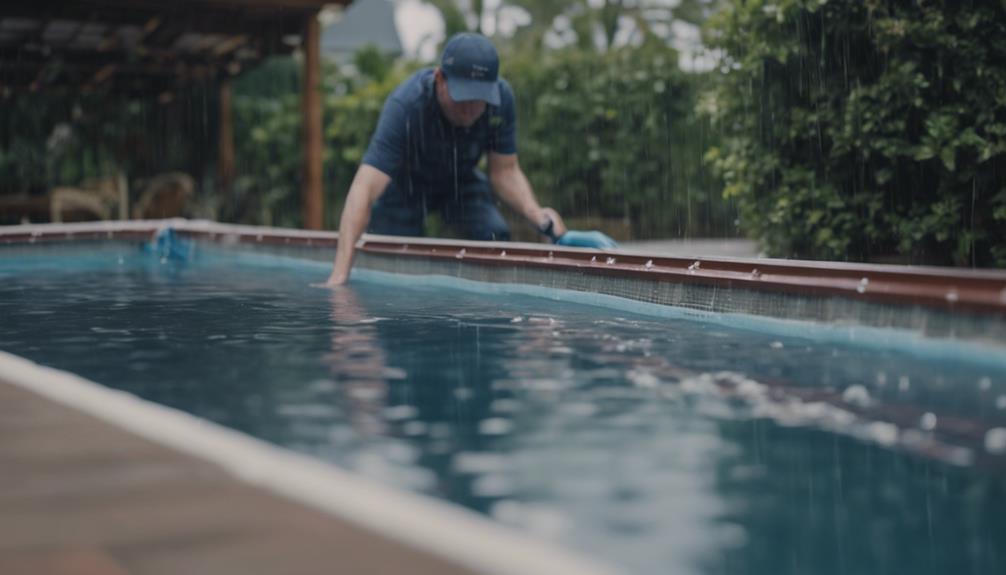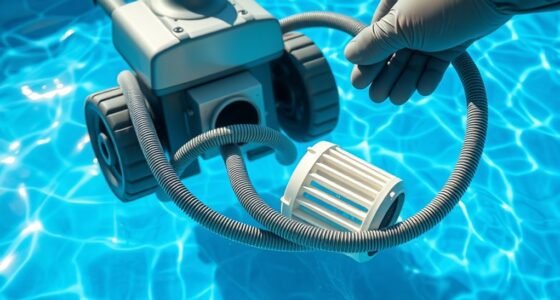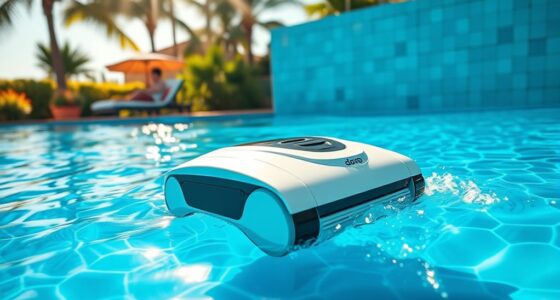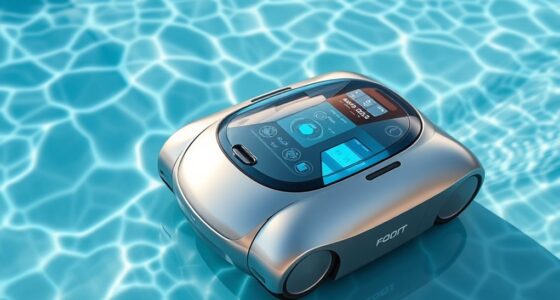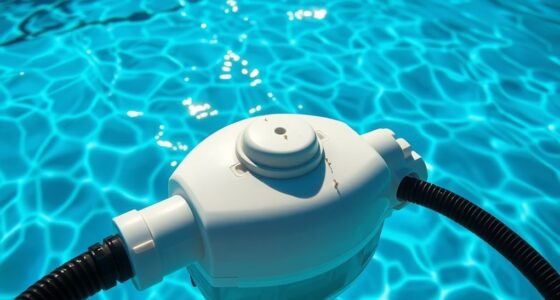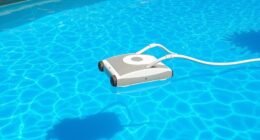During the wet season, it’s important to keep an eye on water levels to avoid overflow and damage. It is crucial to balance chemicals such as pH and chlorine to prevent algae growth. After rainy days, shock your pool with Chloro Maxx 90 TCCA granules. Remember to skim debris daily and vacuum the pool regularly to keep it clean. Make sure to maintain your filtration system by cleaning and checking for any issues. Use pool covers to keep debris out and regularly test chemical levels for proper water clarity and hygiene. By following these tips, you can ensure a safe and clean pool environment.
Key Takeaways
- Monitor water levels to prevent overflow and damage.
- Maintain proper chemical balance for safety and clarity.
- Shock pool with Chloro Maxx 90 TCCA granules after heavy rain.
- Regularly skim and vacuum debris for cleanliness.
- Inspect and clean filtration system to prevent clogs.
Importance of Water Level Monitoring
Monitoring your pool's water level is vital during the rainy season to prevent overflow and potential water damage. Heavy rainfalls can cause a rapid increase in water levels, posing safety risks and potentially leading to costly repairs.
By regularly checking and adjusting the water level, you can guarantee the proper balance needed for excellent pool function. Preventing an inground pool from overflowing during heavy rain is essential not only for the safety of the pool area but also to maintain a pleasant swimming environment.
After rainstorms, it's important to continue monitoring the water levels to prevent any water damage that could occur. By staying vigilant and proactive in managing your pool's water level, you can avoid potential hazards and keep your pool area safe and enjoyable for all.
Balancing Chemical Levels Effectively

Maintaining your pool's pH balance within the recommended range is essential to prevent skin and eye irritation.
Monitor chlorine levels carefully, especially after heavy rainfall, to ensure effective sanitization.
Properly balanced chemical levels are vital in combating algae growth and keeping your pool water safe for swimming.
Ph Balance Importance
Maintaining proper pH balance in your pool is essential for guaranteeing the health and safety of swimmers and the effectiveness of chlorine disinfection. Imbalanced pH levels can lead to skin and eye irritation, as well as hinder chlorine's ability to sanitize the water adequately, allowing harmful bacteria to thrive.
To prevent these issues, it's vital to keep the pH levels between 7.2 and 7.6, which not only promotes ideal sanitation but also ensures water clarity for a pleasant swimming experience. Factors like rainwater runoff can affect pH levels, necessitating regular testing and adjustment to maintain the balance.
Neglecting pH balance can't only impact the health of swimmers but also result in the corrosion of pool equipment and surfaces. Therefore, monitoring and adjusting the pH levels of your pool is a fundamental aspect of maintenance to uphold a safe and enjoyable swimming environment.
Chlorine Levels Control
To effectively balance chemical levels in your pool, maintaining chlorine levels between 1-3 ppm is essential for ensuring proper sanitation and safe swimming conditions.
Using a reliable water testing kit is important in accurately monitoring chlorine levels. Adequate chlorine levels not only prevent bacteria and algae growth but also help maintain a healthy swimming environment.
Adjusting chlorine levels becomes necessary after heavy rain to counteract dilution and contamination that may occur during the rainy season. Consistent chlorine levels are crucial for keeping the water clean and free from harmful microorganisms.
Remember that proper filtration and regular testing are key components of maintaining balanced chlorine levels in your pool. By staying proactive and attentive to your chlorine levels, you can ensure a safe and enjoyable swimming experience for you and your guests throughout the rainy season.
Shocking the Pool After Rain
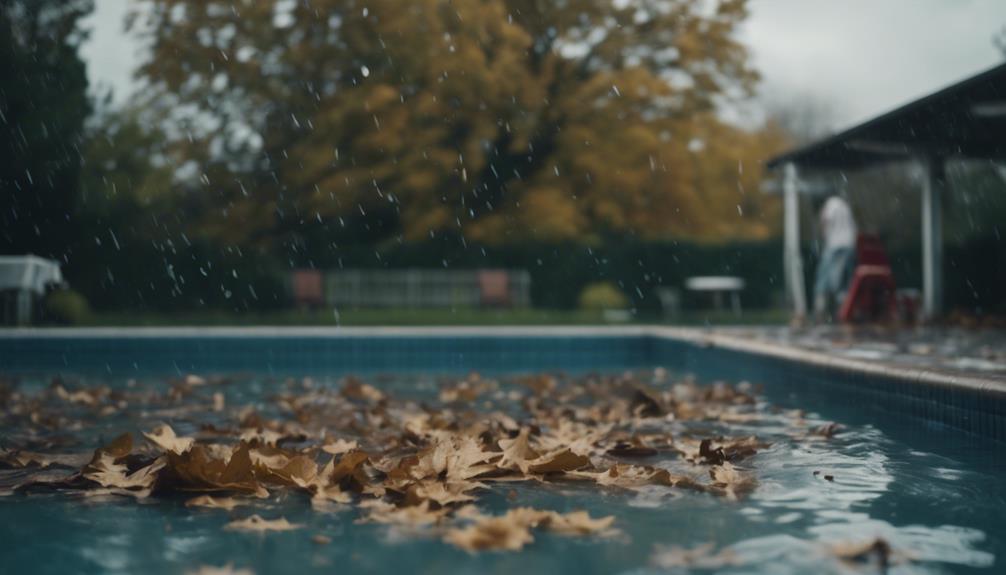
After heavy rainfall, it's important to shock your pool to prevent algae growth and maintain balanced chemical levels.
Using Chloro Maxx 90 TCCA granules for shock treatment can effectively eliminate bacteria and contaminants, keeping a clean and clear pool.
Following proper dosage and application instructions is essential for best results and a safe swimming environment.
Prevent Algae Growth
Using a suitable shock treatment like Chloro Maxx 90 TCCA granules can effectively prevent algae growth in your pool after heavy rainfall. Shocking the pool after rain helps kill bacteria and contaminants introduced by rainwater, maintaining a clean and clear pool. Algae growth can be avoided by timely shocking post rainstorms. It is important to follow the recommended shock treatment dosage and application instructions for best effectiveness. Regularly shocking the pool after rainfall not only preserves water clarity but also upholds proper hygiene standards.
| Prevent Algae Growth Tips | Benefits |
|---|---|
| Use Chloro Maxx 90 TCCA granules | Effectively prevents algae growth |
| Shock after heavy rainfall | Kills bacteria and contaminants |
| Follow dosage instructions | Ensures best effectiveness |
| Regularly shock post rainstorms | Maintains water clarity and hygiene |
Balance Chemical Levels
Maintain a balanced pool environment by promptly shocking the pool with chlorine after heavy rainfall to eliminate bacteria and algae introduced by rainwater. This important step guarantees the chlorine level is sufficient to combat contaminants from the rain, maintaining the chemical balance of your pool.
When shocking the pool after rainstorms, it's essential to take into account the water chemistry and sanitizer levels to prevent cloudy water and algae growth. Utilizing shock treatments like Chloro Maxx 90 TCCA granules following the manufacturer's instructions helps in maintaining a clean and clear pool environment.
By regularly shocking the pool after heavy rains, you can effectively eliminate bacteria, algae, and other impurities, promoting water clarity and hygiene. Remember, maintaining the balance of your pool's chemical levels is key to enjoying a safe and healthy swimming experience.
Keep a close eye on the sanitizer levels to ensure your pool remains a pristine oasis for relaxation and fun.
Skimming and Vacuuming Debris

Regularly skimming and vacuuming debris from your pool is essential to maintain its cleanliness and prevent the buildup of contaminants. To begin, make it a habit to skim the water surface daily to remove leaves, twigs, and any other debris that may have accumulated. This simple task helps in keeping your pool looking pristine.
In addition to skimming, using a pool vacuum is important for cleaning the bottom of the pool and removing finer debris and contaminants that may have settled there. Be sure to pay extra attention to areas where debris tends to accumulate, such as corners and steps.
To guarantee efficient cleaning, remember to empty the vacuum's debris bag or clean the filter regularly. This step is crucial for maintaining the effectiveness of your cleaning equipment.
Optimal Filtration System Maintenance

For effective maintenance of your pool during the rainy season, ensuring the peak performance of your filtration system is vital. Regularly inspect and clean the filtration system to prevent clogs and maintain excellent performance.
Check the pressure gauge on the filter and perform backwash or clean the filter as needed to uphold efficient water circulation. Monitoring the filtration system for any signs of damage or wear is essential; promptly replace any worn-out components to prevent disruptions in filtration.
Remember that the pump plays a significant role in supporting proper filtration and water circulation in the pool, so ensure it's functioning correctly.
Using Pool Covers Wisely
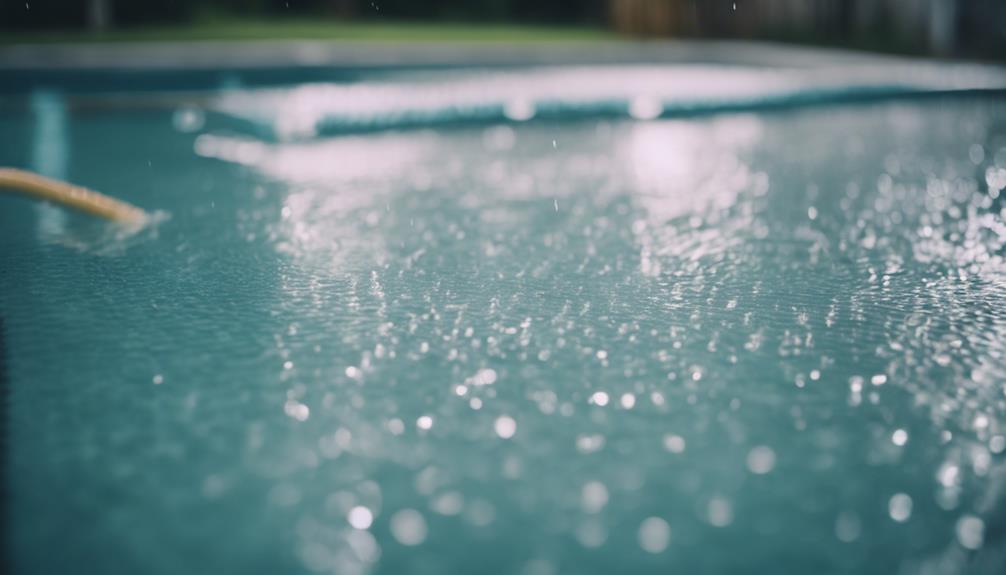
To protect your pool from debris, contaminants, and rainwater during the rainy season, using pool covers wisely is a practical solution. Here are some tips for using a pool cover effectively:
- Choose the Right Cover: Select a cover that suits your needs; solid covers provide complete protection against debris and water runoff, while mesh covers allow water passage while keeping out debris.
- Proper Installation: Guarantee the pool cover is correctly installed and securely fastened to prevent debris from entering the pool.
- Regular Maintenance: Clean the pool cover periodically to prevent debris build-up on the cover itself, which could eventually find its way into the pool water.
- Remove Standing Water: If rainwater accumulates on the pool cover, use a pump or siphon to eliminate it promptly to prevent excess water from seeping into the pool and causing imbalance.
Preventing Debris Entry

Using a pool cover is an important method to prevent debris from entering your pool during the rainy season. By securely covering your pool when not in use, you can greatly reduce the amount of leaves, twigs, and other debris that may be blown in by the wind and rain.
Additionally, it's vital to skim the pool surface regularly to remove any debris that manages to get past the cover. This simple task can help maintain the cleanliness of your pool water and prevent clogs in the filtration system.
Remember to clean the skimmer and pump baskets frequently to guarantee proper water circulation and filtration efficiency. Adjusting the water levels is also essential to prevent overflowing and debris accumulation, especially during heavy rainfalls.
Ensuring Water Clarity and Hygiene
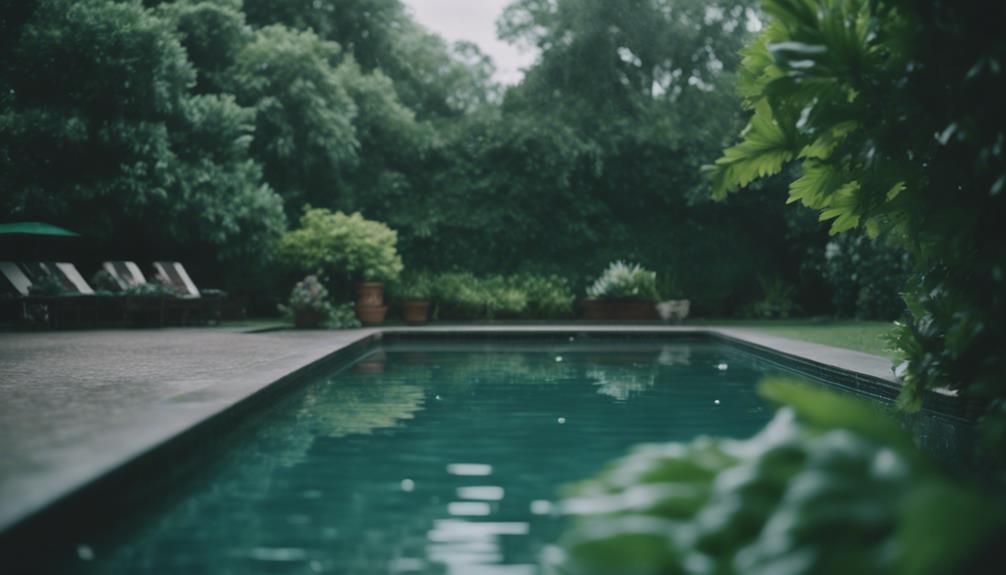
Maintain water clarity and hygiene in your pool during the rainy season by regularly testing and adjusting chemical levels. Follow these tips to guarantee a clean and safe swimming environment:
- Test Chemical Levels: Regularly check and adjust chlorine and pH levels to prevent bacteria growth and maintain water clarity.
- Shock Treatment: After heavy rainfall, shock your pool with chlorine to eliminate bacteria and prevent algae growth, securing a healthy swimming environment.
- Pool Vacuum: Use a pool vacuum to remove debris and contaminants brought in by rainstorms, keeping your pool water clear and free from impurities.
- Monitor Algae Growth: Keep an eye out for any signs of algae growth and take immediate action to prevent it from spreading, maintaining water clarity and hygiene.
Frequently Asked Questions
How to Maintain a Pool During Rainy Season?
To maintain a pool during the rainy season, monitor water levels closely to prevent overflow.
Balance chemical levels regularly as rainwater can affect pH and sanitizer levels.
After rainstorms, shock the pool with chlorine to kill bacteria and prevent algae growth.
Keep the pool clean by skimming and vacuuming debris to avoid clogs.
Check the filtration system often to guarantee peak performance and prevent damage from heavy rainfall.
Should I Shock My Pool Everytime It Rains?
You should shock your pool after every rainfall to combat bacteria and contaminants introduced by rainwater. This step is vital in maintaining water quality and preventing issues like cloudy water and algae growth.
Following correct shock treatment instructions, such as using Chloro Maxx 90 TCCA granules, is essential for effective sanitization. Regularly shocking your pool post-rainfall guarantees water clarity and hygiene, safeguarding your pool from potential problems caused by rainwater pollutants.
Should I Add Chemicals to Pool When It's Raining?
You should avoid adding chemicals to your pool during rainy weather. Rainwater can quickly dilute the chemicals, affecting the water balance.
It's best to wait until after the rain has ceased and the pool water has stabilized before adding any chemicals. This approach guarantees that your treatments are effective and your pool maintains the right chemical balance.
Should I Run My Pool Pump When It Rains?
You should definitely run your pool pump when it rains. By doing so, you prevent water stagnation, debris buildup, algae growth, and bacterial contamination.
The pump circulates and filters rainwater, maintaining water quality and ensuring even distribution of chemicals for a clean and healthy pool environment.
Keeping the pump running during rain is essential for effective pool maintenance.
What are Some Essential Pool Maintenance Tips for the Rainy Season?
During the rainy season, it’s crucial to follow essential pool cleaning tips to keep your pool in top condition. Regularly remove fallen leaves and debris, check and maintain the water pH levels, and use a pool cover to prevent contamination. These simple steps will help ensure your pool stays clean and safe.
Conclusion
In summary, maintaining your pool during the rainy season is vital for its longevity and your enjoyment. By monitoring water levels, balancing chemical levels, shocking the pool, and regularly cleaning debris, you can guarantee excellent water clarity and hygiene.
Remember to utilize pool covers, prevent debris entry, and keep your filtration system in top condition. As the saying goes, 'a little maintenance goes a long way' in preserving the beauty and functionality of your pool.

